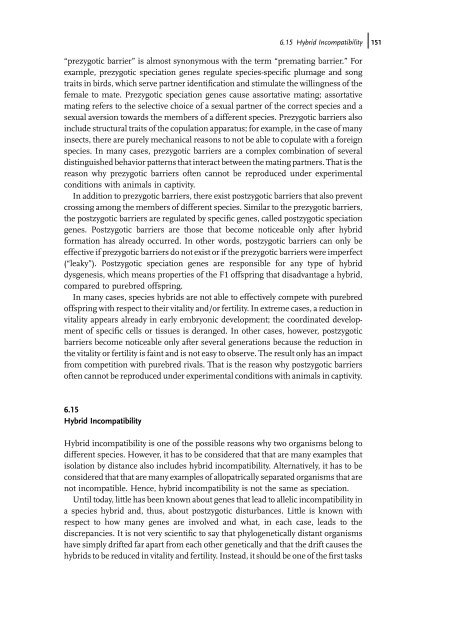Principios de Taxonomia
You also want an ePaper? Increase the reach of your titles
YUMPU automatically turns print PDFs into web optimized ePapers that Google loves.
prezygotic barrier is almost synonymous with the term premating barrier. For<br />
example, prezygotic speciation genes regulate species-specific plumage and song<br />
traits in birds, which serve partner i<strong>de</strong>ntification and stimulate the willingness of the<br />
female to mate. Prezygotic speciation genes cause assortative mating; assortative<br />
mating refers to the selective choice of a sexual partner of the correct species and a<br />
sexual aversion towards the members of a different species. Prezygotic barriers also<br />
inclu<strong>de</strong> structural traits of the copulation apparatus; for example, in the case of many<br />
insects, there are purely mechanical reasons to not be able to copulate with a foreign<br />
species. In many cases, prezygotic barriers are a complex combination of several<br />
distinguished behavior patterns that interact between the mating partners. That is the<br />
reason why prezygotic barriers often cannot be reproduced un<strong>de</strong>r experimental<br />
conditions with animals in captivity.<br />
In addition to prezygotic barriers, there exist postzygotic barriers that also prevent<br />
crossing among the members of different species. Similar to the prezygotic barriers,<br />
the postzygotic barriers are regulated by specific genes, called postzygotic speciation<br />
genes. Postzygotic barriers are those that become noticeable only after hybrid<br />
formation has already occurred. In other words, postzygotic barriers can only be<br />
effective if prezygotic barriers do not exist or if the prezygotic barriers were imperfect<br />
( leaky ). Postzygotic speciation genes are responsible for any type of hybrid<br />
dysgenesis, which means properties of the F1 offspring that disadvantage a hybrid,<br />
compared to purebred offspring.<br />
In many cases, species hybrids are not able to effectively compete with purebred<br />
offspring with respect to their vitality and/or fertility. In extreme cases, a reduction in<br />
vitality appears already in early embryonic <strong>de</strong>velopment; the coordinated <strong>de</strong>velopment<br />
of specific cells or tissues is <strong>de</strong>ranged. In other cases, however, postzygotic<br />
barriers become noticeable only after several generations because the reduction in<br />
the vitality or fertility is faint and is not easy to observe. The result only has an impact<br />
from competition with purebred rivals. That is the reason why postzygotic barriers<br />
often cannot be reproduced un<strong>de</strong>r experimental conditions with animals in captivity.<br />
6.15<br />
Hybrid Incompatibility<br />
6.15 Hybrid Incompatibilityj151<br />
Hybrid incompatibility is one of the possible reasons why two organisms belong to<br />
different species. However, it has to be consi<strong>de</strong>red that that are many examples that<br />
isolation by distance also inclu<strong>de</strong>s hybrid incompatibility. Alternatively, it has to be<br />
consi<strong>de</strong>red that that are many examples of allopatrically separated organisms that are<br />
not incompatible. Hence, hybrid incompatibility is not the same as speciation.<br />
Until today, little has been known about genes that lead to allelic incompatibility in<br />
a species hybrid and, thus, about postzygotic disturbances. Little is known with<br />
respect to how many genes are involved and what, in each case, leads to the<br />
discrepancies. It is not very scientific to say that phylogenetically distant organisms<br />
have simply drifted far apart from each other genetically and that the drift causes the<br />
hybrids to be reduced in vitality and fertility. Instead, it should be one of the first tasks



